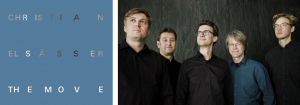
“Streaming here!“
“Buy CD here!“
“Webpage Christian Elsässer”
Christian Elsässer (Piano) – Niels Klein (Sax) – Tim Collins (Vibraphone) – Henning Sieverts (Bass)
Fabian Arends (Drums)
Life is change. At its best, it gives rise to inventive jazz—as in Christian Elsässer’s new album The Move.
After a long phase working primarily as a composer, arranger and conductor for big bands and orchestras Christian Elsässer reveals a particularly intimate, chamber-like side on his new quintet album.
„While working on the music a lot of changes were about to happen in my personal life. The most crucial one was that my wife and I decided to leave Munich behind and create a new home for our family in the country-side.“ This emotional shift—filled with excitement, nostalgia, and the magic of new beginnings—runs like a thread throughout the album.
The choice of musicians and the associated instrumentation had a decisive influence on the realization of the compositional ideas. „For this recording I invited four long time friends with whom I have worked in various musical contexts – but never in exactly this lineup. When mentally assembling the band’s sound, I was imme-diately fascinated by the many colorful possibilities that arose from the combination of instruments.“
With The Move, Christian Elsässer creates a musical diary of change: a journey full of farewells and new be-ginnings, shaped by the growth of a family and the quiet yet profound changes that life brings over time. It explores movement in its deeply rooted facets—from the life-changing experience of relocating to a new place to the small and significant steps toward a nature-oriented way of life. Pieces like Birds, Morgentau, and Wie-genlied create sonic landscapes drawing on the rich palette of modern jazz. Other original compositions, such as Kanon and Circles & Corners, reflect Elsässer’s inventive structural concepts, already hinted at in their titles. Likewise, Short Story No. 2 follows a self-imposed challenge: to fit entirely on a single sheet of music—quite a contrast to his large-ensemble arrangements, which typically require dozens of pages.
Christian Elsässer is one of the most versatile voices of contemporary Jazz in Europe. He is regularly commissi-oned by top ensembles such as the Metropole Orkest (three-time Grammy winner), the Scottish National Jazz Orchestra, and all four German radio big bands (WDR, HR, NDR, SWR). He has worked with a wide range of acclaimed artists such as Dee Dee Bridgewater, Kurt Elling, Aaron Parks and Mike Stern. Elsässer is also a pro-fessor of Composition and Jazz Piano at the University of Music and Performing Arts Munich.







 “Smile” is the name of the new album by Martin Weiss and the David and Danino Weiss Quartet. And it also begins with the song of the same name, the most famous composition by Charlie Chaplin. A choice that perfectly describes the character of the album in several respects. First, because the piece, later made famous by Nat King Cole and today played as a jazz and pop standard by countless performers, dates from 1936. The time when Django Reinhardt invented the only original European style in the classical era of jazz: the Gypsy Swing, also called Jazz Manouche or Hot Jazz. Then, because “Smile” with its highly emotional mixture of melancholy and consolation fits exactly the ambivalence of Gypsy Swing. And finally, because the piece comes from the film “Modern Times”, which deals precisely with the interface between tradition and departure, which is now also the musical focus of Martin, David and Danino Weiß.
“Smile” is the name of the new album by Martin Weiss and the David and Danino Weiss Quartet. And it also begins with the song of the same name, the most famous composition by Charlie Chaplin. A choice that perfectly describes the character of the album in several respects. First, because the piece, later made famous by Nat King Cole and today played as a jazz and pop standard by countless performers, dates from 1936. The time when Django Reinhardt invented the only original European style in the classical era of jazz: the Gypsy Swing, also called Jazz Manouche or Hot Jazz. Then, because “Smile” with its highly emotional mixture of melancholy and consolation fits exactly the ambivalence of Gypsy Swing. And finally, because the piece comes from the film “Modern Times”, which deals precisely with the interface between tradition and departure, which is now also the musical focus of Martin, David and Danino Weiß.